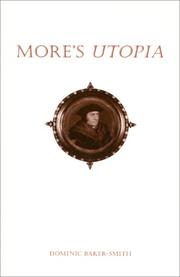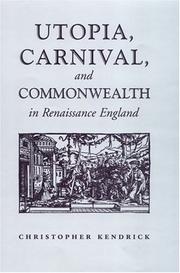| Listing 1 - 3 of 3 |
Sort by
|

ISBN: 9786611995966 1281995967 1442677392 9781442677395 0802083765 9780802083760 Year: 2000 Publisher: Toronto
Abstract | Keywords | Export | Availability | Bookmark
 Loading...
Loading...Choose an application
- Reference Manager
- EndNote
- RefWorks (Direct export to RefWorks)
"Utopia has a strong claim to be the most misunderstood book ever written: its flame has been hijacked by countless idealistic schemes having little in common with More's own assessment of social possibilities. For although it contributes to a line of argument that can be traced from Plato to Marx, Utopia is first and foremost a literary work that appeals to the imagination and seeks to question us rather than to proffer answers." "This study prepares the reader for these challenges, placing the work in the context of early sixteenth-century Europe and the intellectual preoccupations of More's own humanist circle, and clarifying those sources in classical and Christian political thought that provoked his writing." "Utopia is presented as a reflection on political idealism, one that has lost none of its relevance in an age that has witnessed the collapse of Marxist aspirations to social control. Dominic Baker-Smith also surveys the varied critical reception accorded to Utopia over the last four centuries, providing a look at Utopia's role in cultural history."--Jacket
LITERARY CRITICISM / European / General. --- More, Thomas, --- 873.4 MORE, THOMAS --- 873.4 MORE, THOMAS Humanistisch Latijnse literatuur--MORE, THOMAS --- Humanistisch Latijnse literatuur--MORE, THOMAS --- Utopia (More, Thomas, Saint) --- De optimo reipublicae statu, deque nova insula Utopia, libri II (More, Thomas, Saint) --- Thomae Mori Utopia (More, Thomas, Saint) --- Utopia (More, Thomas, Sir, Saint) --- English literature --- History and criticism.
Book
ISBN: 1487534485 1487534493 9781487534486 9781487506599 1487506597 Year: 2020 Publisher: Toronto
Abstract | Keywords | Export | Availability | Bookmark
 Loading...
Loading...Choose an application
- Reference Manager
- EndNote
- RefWorks (Direct export to RefWorks)
"This unique study considers the influences of Stoic critics on the evolution of Thomas More's thought. The author argues that More's engaement with Erasmus's work radicalized his understanding of Christianity and shaped the writing of Utopia."--
Learning and scholarship. --- More, Thomas, --- Erudition --- Scholarship --- Civilization --- Intellectual life --- Education --- Research --- Scholars --- More, Thomas --- Thomas More --- Moro, Tommaso --- Morus, Thomas --- Morus, T. --- More, T. --- Moro, Tomás --- Moor, Thomas, --- Moore, Thomas, --- Mor, Tomas, --- More, Tomás, --- Moro, Thomaz, --- Moro, Tomás, --- Moro, Tommaso, --- Morus, Tamás, --- Morus, Thomas, --- Morus, Tomasz, --- מורוס, תומאס, --- Моръ, Томасъ, --- Morʺ, Tomasʺ, --- Christianity. --- Cicero. --- Desiderius Erasmus. --- Enchiridion. --- Lucian. --- Renaissance. --- Seneca. --- Stoicism. --- The Praise of Folly. --- Thomas More. --- Utopia. --- historyof literature. --- intellectual history. --- philosophy. --- theology. --- Learning and scholarship --- Utopia (More, Thomas, Saint) --- De optimo reipublicae statu, deque nova insula Utopia, libri II (More, Thomas, Saint) --- Thomae Mori Utopia (More, Thomas, Saint) --- Utopia (More, Thomas, Sir, Saint)

ISBN: 128199250X 9786611992507 144268299X 9781442682993 9781281992505 0802089364 9780802089366 Year: 2004 Publisher: Toronto
Abstract | Keywords | Export | Availability | Bookmark
 Loading...
Loading...Choose an application
- Reference Manager
- EndNote
- RefWorks (Direct export to RefWorks)
With the emergence of utopia as a cultural genre in the sixteenth century, a dual understanding of alternative societies, as either political or literary, took shape. In Utopia, Carnival, and Commonwealth in Renaissance England, Christopher Kendrick argues that the chief cultural-discursive conditions of this development are to be found in the practice of carnivalesque satire and in the attempt to construct a valid commonwealth ideology. Meanwhile, the enabling social-political condition of the new utopian writing is the existence of a social class of smallholders whose unevenly developed character prevents it from attaining political power equivalent to its social weight. In a detailed reading of Thomas More's Utopia, Kendrick argues that the uncanny dislocations, the incongruities and blank spots often remarked upon in Book II's description of Utopian society, amount to a way of discovering uneven development, and that the appeal of Utopian communism stems from its answering the desire of the smallholding class (in which are to be numbered European humanists) for unity and power. Subsequent chapters on Rabelais, Nashe, Marlowe, Bacon, Shakespeare, and others show how the utopian form engages with its two chief discursive preconditions, carnival and commonwealth ideologies, while reflecting the history of uneven development and the smallholding class. Utopia, Carnival, and Commonwealth in Renaissance England makes a novel case for the social and cultural significance of Renaissance utopian writing, and of the modern utopia in general.
English literature --- Utopias in literature. --- Politics and literature --- Satire, English --- Imaginary societies in literature. --- Carnival in literature. --- Renaissance --- Utopian literature --- History and criticism. --- History --- More, Thomas, --- Moor, Thomas, --- Moore, Thomas, --- Mor, Tomas, --- More, Tomás, --- Moro, Thomaz, --- Moro, Tomás, --- Moro, Tommaso, --- Morus, Tamás, --- Morus, Thomas, --- Morus, Tomasz, --- מורוס, תומאס, --- Моръ, Томасъ, --- Morʺ, Tomasʺ, --- Influence. --- Carnival in literature --- Imaginary societies in literature --- Utopias in literature --- 820 "15/16" --- 820 "15/16" Engelse literatuur--?"15/16" --- Engelse literatuur--?"15/16" --- History and criticism --- More, Thomas --- Thomas More --- Moro, Tommaso --- Morus, Thomas --- Morus, T. --- More, T. --- Moro, Tomás --- Influence --- Early modern, 1500-1700 --- Great Britain --- 16th century --- 17th century --- Satire [English ] --- England --- Utopia (More, Thomas, Saint) --- Englisch. --- Great Britain. --- England. --- De optimo reipublicae statu, deque nova insula Utopia, libri II (More, Thomas, Saint) --- Thomae Mori Utopia (More, Thomas, Saint) --- Utopia (More, Thomas, Sir, Saint) --- Anglia --- Angliyah --- Briṭanyah --- England and Wales --- Förenade kungariket --- Grã-Bretanha --- Grande-Bretagne --- Grossbritannien --- Igirisu --- Iso-Britannia --- Marea Britanie --- Nagy-Britannia --- Prydain Fawr --- Royaume-Uni --- Saharātchaʻānāčhak --- Storbritannien --- United Kingdom --- United Kingdom of Great Britain and Ireland --- United Kingdom of Great Britain and Northern Ireland --- Velikobritanii͡ --- Wielka Brytania --- Yhdistynyt kuningaskunta --- Northern Ireland --- Scotland --- Wales --- Angleterre --- Anglii͡ --- Anglija --- Engeland --- Inghilterra --- Inglaterra
| Listing 1 - 3 of 3 |
Sort by
|

 Search
Search Feedback
Feedback About UniCat
About UniCat  Help
Help News
News